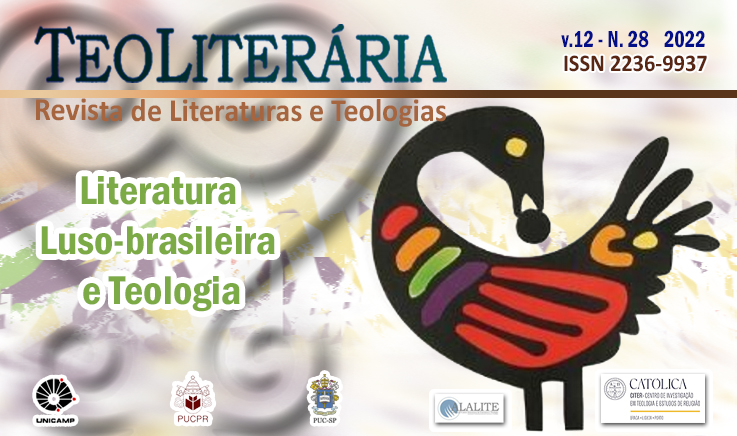Søren Kierkegaard’s conceptual appropriation of biblical characters in his edifying discourses
DOI:
https://doi.org/10.23925/2236-9937.2022v28p294-308Keywords:
Kierkegaard, edifying discourses, leap of faith, biblical charactersAbstract
Søren Kierkegaard’s (1813 – 1855) thought works with the stylistic articulation between form and content. For his philosophy of existence, “what” is said about the existing being must be necessarily articulated with the “how” it is said. Through an indirect communication of the becoming of a self – the most important task in existence – Kierkegaard criticizes the philosophical and doctrinaires’ religious systems. For that, he will use linguistic figures, humor, irony, pseudonyms, and biblical characters as subjective models. The scope of this paper is to analyze specifically how this appropriation of biblical characters is made in two of his edifying discourses. In the first moment, we will expose the religious anthropology upon which Kierkegaard edifies that existential movement of becoming a self and overcoming sin and despair through a leap of faith. Then, we will analyze how Kierkegaard appropriates the biblical characters (Job and the Woman who was a Sinner) to, less than explain them, to provide subjective models of the leap of faith in a way it can be finally appropriated by the reader in her own existential movement.
References
AUMANN, Antony. Kierkegaard, Paraphrase, and the Unity of Form and Content. Philosophy Today. 57 (4): 376–387. 2013.
CAMP, Elizabeth. Two Varieties of Literary Imagination: Metaphor, Fiction, and Thought Experiments. Midwest Studies in Philosophy. vol. 33, no. 1: 107–130. 2009.
KIERKEGAARD, Søren. O conceito de ironia: constantemente referido a Sócrates. Traduzido por Álvaro L. M. Valls. Petrópolis: Editora Vozes. 1991.
KIERKEGAARD, Søren. Eighteen Upbuilding Discourses. Ed. e trad. com introdução e notas de Howard V. Hong e Edna H. Hong. New Jersey: Princeton University Press, 1990.
KIERKEGAARD, Søren. Migalhas Filosóficas: ou um bocadinho de filosofia de João Clímacus. Trad. Ernani Reichmann e Álvaro Valls. Petrópolis: Vozes. 1995
KIERKEGAARD, Søren. O Conceito de Angústia. Trad. Álvaro Valls. Petrópolis: Vozes de Bolso. 2010.
KIERKEGAARD, Søren. The Sickness unto Death. Ed. e trad. com introdução e notas de Howard V. Hong e Edna H. Hong. New Jersey: Princeton University Press, 1980.
KIERKEGAARD, Søren. Without Authority. Ed. e trad. com introdução e notas de Howard V. Hong e Edna H. Hong. New Jersey: Princeton University Press, 1997.
KIERKEGAARD, Søren. Ponto de vista explicativo de minha obra enquanto escritor. Traduzido por João Gama. Lisboa: Edições 70. s.d.
LE BLANC, Charles. Kierkegaard. Trad. Marina Appenzeller. São Paulo: Estação Liberdade. 2003.
LOPES, Paulo Henrique. O Labirinto Existencial-Religioso: a dialética entre forma e conteúdo no estilo da obra kierkegaardiana. Tese de mestrado. PPCIR, UFJF, 2018.
POOLE, Roger. Kierkegaard: the indirect communication. Virginia: University of Virginia Press. 1993.
ROOS, Jonas. Tornar-se cristão: o Paradoxo Absoluto e a existência sob juízo e graça em Soren Kierkegaard. Instituto Ecumênico de Pós-graduação em Teologia, Escola Superior de Teologia. São Leopoldo, 2007.
Published
How to Cite
Issue
Section
License
Copyright (c) 2022 Teoliteraria - Journal of Literatures and Theologies (On Line) ISSN 2236-9937

This work is licensed under a Creative Commons Attribution 4.0 International License.
TeoLiteraria – Journal of Literatures and Theologies owns the copyright of all published material. The whole reproduction of the articles of this Journal in other publications or for any other purpose, by any means, requires a written permission of the editor of this journal. Partial reproductions of articles (abstracts, more than 500 words text, tables, figures and other illustrations) must have a permission written by the publisher and the authors.

